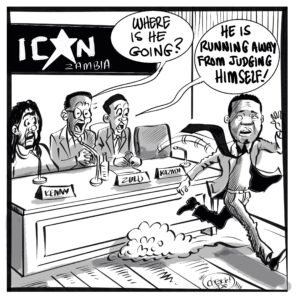‘Grandma,’ said Ethel, ‘tell me what life was like when you were a little girl.’
‘Let’s go outside and sit under the guava tree,’ said Grandma, ‘then I’ll tell you a bit about the past.’
As they settled down on two stools, Grandma began her story. ‘In 2018, seventy years ago, I was a little girl like you, only ten years old.’
‘Wow, Grandma, so now you’re eighty years old! So what was it like in Ching Chang back in those days.’
‘Well, first of all, the country wasn’t called Ching Chang. In those days it was called Zambia, we were an independent country and we were all Zambians.’
‘What!’ exclaimed Ethel, ‘Zambians? I’ve never heard of that! I thought we were all Natives.’
‘We are now,’ said Grandma sadly. ‘But when I was your age I was a Zambian and I never became a Native until ten years later. That was in 2028 the year when the Chinese took over and we Zambians all became Natives. Later this year, 2088, our Chinese masters will be celebrating the sixtieth anniversary of the founding of Ching Chang as a Chinese colony.’
‘Good gracious,’ said Ethel. ‘My teacher has never told us anything about a place called Zambia.’
‘Of course not, they’re only allowed to teach Chinese history. They teach only about China and nothing about Zambia. Anybody who starts whispering about Zambia is sent to a labour camp for re-education. That’s why I took you outside to sit under this guava tree. These little old houses in Chilenji are full of secret Chinese listening devices.’
‘Have you always lived in this little house in Chilenje, Grandma?’
‘Good gracious no, my child. My parents were well off and I was brought up in a big house in Rhodes Park. My father drove a Mercedes and my mother used to drive me to school in her Corolla and we were quite well off.’
‘Now your story is getting a bit unbelievable,’ gasped Ethel, ‘only the Chinese live in such places as Rhodes Park. We Natives live in the compounds and workers hostels. I’ve never heard of a Native living in Rhodes Park!’
‘Ethel, you’re not listening to what I’m telling you. Your family were not Natives in those days, we were Zambians and some of us were quite well off. Many of the wealthier Zambians lived in Woodlands and Kabulonga and such places. It was quite normal.’
‘Woodlands! Kabulonga! So where did the Chinese live?’
‘There were only a few thousand in those days, not the millions we have today. My mother, your great-grandmother, told me that when she was a little girl, back in the 1980s, it was very rare to see a Chinese person.’
‘But if there were so few in those days, how did they become so many and manage to steal the entire country? Did they invade with a big army of millions of soldiers?’
‘Nothing like that,’ said Grandpa. ‘It all started when the Zambian government wanted to expand the economy by building lots of roads and factories. The only problem was that they didn’t have the money. But lots of Chinese companies came in and said We’ll build these things for you, and we’ll also lend you the money and you can pay us later.’
‘Which wasn’t a good idea.’
‘Of course not. But unfortunately the Zambian government didn’t know that because they didn’t understand money and they foolishly thought that the Chinese were just generous friends.’
‘So the Zambian government soon had a big debt they couldn’t pay?’
‘Exactly. Many years passed and the Chinese couldn’t get any of their money back. Which of course was exactly what they had expected. Their secret plan had always been to ask for land rather than money. So instead of $2billion for the first road they built they asked for the Natural Resources Destruction College – 30 hectares of prime land right in the middle of Lusaka.’
‘And they got it?’
‘Oh yes. After that they got Jacaranda School and turned it into the Beijing Academy for Chinese Education. To settle a debt of $3billion they were given the Ministry of Lands, staffed it with Chinese surveyors, and began allocating land to themselves. To settle a debt of only $4billion dollars they were given the Ministry of Local Government, which immediately issued a Compulsory Purchase Order for all property in Woodlands, Kabulonga, Sunningale and Rhodes Park.’
‘With all Zambian residents relocated to Chilenji and Matero?’
‘Yes. And all residents of Chilenji and Matero were relocated to labour camps in Shang’ombo. They took the National Assembly and turned it into the Secretariat of the Ching Chang Politbureau. State House became the Residence of the Colonial Governor. The entire country of Zambia was sold off to settle a debt of only $25billion. All Chinese became citizens and all Zambians became Natives who could only enter a Chinese area if they had been issued with a chitupa by the Chinese government.’
‘So what happened to the former Zambian government?’
‘They were all given large mansions in eSwatini so that they could escape the wrath of the Natives.’
‘Is it ever possible,’ Ethel whispered, ‘that we Natives might one day rise up and chase the Chinese?’
‘Some people say,’ whispered Grandma, ‘that in Chinsali Labour Camp there is a young man called Kondwa Kunda who has started a clandestine movement called the United National Independence Party.’
























